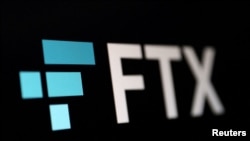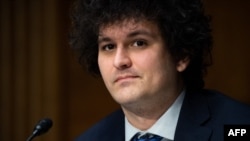Law enforcement officials and financial services regulators have filed a raft of criminal and civil charges against Sam Bankman-Fried, the founder of the bankrupt cryptocurrency exchange company FTX, alleging wide-ranging fraud that eventually brought down the company, which was valued at $32 billion earlier this year.
The Department of Justice on Tuesday morning unsealed an indictment charging Bankman-Fried with eight criminal counts, including conspiracy to commit wire fraud, actual wire fraud, money laundering, and violation of laws governing donations to politicians and political parties.
At the request of U.S. prosecutors, Bankman-Fried, 30, was arrested on Monday evening at his home in the Bahamas, where the headquarters of FTX is located. The U.S. and the Bahamas have an extradition treaty, and Bankman-Fried is expected to be transferred to U.S. custody in the near future.
'House of cards'
Earlier Tuesday, the Securities and Exchange Commission issued its own set of civil charges, also accusing Bankman-Fried of "years-long fraud" that included hiding information from investors, diverting customer funds to a hedge fund he owned, using other customer funds to make political donations, and to purchase hundreds of millions of dollars in real estate.
"We allege that Sam Bankman-Fried built a house of cards on a foundation of deception while telling investors that it was one of the safest buildings in crypto," said SEC Chair Gary Gensler. "The alleged fraud committed by Mr. Bankman-Fried is a clarion call to crypto platforms that they need to come into compliance with our laws."
Also on Tuesday, the Commodity Futures Trading Commission filed a lawsuit against Bankman-Fried.
Rapid rise, rapid fall
In the short time since its founding in 2019, FTX grew to be one of the largest cryptocurrency exchanges in the world, and Sam Bankman-Fried — often referred to as "SBF" — became one of the industry’s most recognizable figures. He was a regular speaker at business conferences, gave testimony before Congress, and was seen by many as a model cryptocurrency executive.
The list of investors who plowed billions of dollars into FTX is long and distinguished, including Sequoia Capital, SoftBank Group, Tiger Global Management, and Third Point Ventures.
Earlier this year, Bankman-Fried positioned his company as a savior for the broader crypto industry when a broad selloff of cryptocurrencies left many firms in the space reeling. FTX extended lines of credit to crypto lender BlockFi and crypto broker Voyager Digital in an effort to help them weather the storm. Both BlockFi and Voyager eventually filed for bankruptcy protection.
Signs of trouble
In September, news reports began raising questions about the relationship between FTX and Alameda Research, a hedge fund owned by Bankman-Fried which was supposed to be a completely separate corporate entity from FTX.
However, it gradually became clear that the two companies were actually closely connected. Media reports began to reveal that a large share of Alameda’s assets was tied up in an illiquid crypto token called FTT, which was issued by FTX. Over several days in early November, customers rushed to pull their money from accounts with FTX, sending the company into a massive liquidity crisis and forcing it to stop processing customer withdrawals.
After several days of attempts to arrange a rescue package, including a briefly considered sale of FTX to Binance, its largest competitor, FTX, Alameda, and more than 100 affiliated companies filed for bankruptcy.
On Tuesday, the Justice Department and the SEC alleged that Alameda actually had "virtually unlimited" access to funds held by FTX on behalf of its customers.
The charges against Bankman-Fried claim that Alameda illegally used those funds to invest in highly illiquid cryptocurrency tokens, as well as to make “undisclosed venture investments, lavish real estate purchases, and large political donations.”
Before its collapse, cryptocurrency investors around the world had placed billions of dollars in their accounts with FTX. In large part because of transfers to Alameda, FTX is facing an estimated shortfall of $8 billion.
'I made a lot of mistakes'
Against the advice of his attorneys, Bankman-Fried has given a number of interviews to news organizations since his company declared bankruptcy. His contention has been that, while he may have made mistakes, he never intended to defraud anyone.
In early December, Bankman-Fried told The Wall Street Journal that he could not account for money that FTX customers transferred to Alameda Research.
In an appearance at a conference sponsored by The New York Times, he said, "Clearly I made a lot of mistakes. There are things I would give anything to be able to do over again. I did not ever try to commit fraud on anyone. I was excited about the prospects of FTX a month ago. I saw it as a thriving, growing business. I was shocked by what happened [in November.]"
His claims contradict the allegations leveled by prosecutors in the indictment unsealed Tuesday, which accuse Bankman-Fried of "willfully and knowingly" defrauding investors and customers.
'Utter failure' of controls
Last month, control of FTX and its constituent companies was turned over to John Ray III, an attorney and corporate insolvency specialist who has been brought on to manage multiple companies facing bankruptcy, including the failed energy giant Enron in the early 2000s. His primary task will be to assemble all the remaining assets of FTX in an effort to recover some of the money its customers lost in the exchange’s collapse.
Ray appeared at a hearing held by the House Financial Services Committee on Tuesday, during which he described a company that lacked even the most basic corporate governance structures and was run by a small cabal ill-equipped for the job of running a multi-billion dollar corporation.
In prepared testimony, Ray said, "[N]ever in my career have I seen such an utter failure of corporate controls at every level of an organization, from the lack of financial statements to a complete failure of any internal controls or governance whatsoever."
In the broadest sense, Ray said, the company’s failure was the result of the "absolute concentration of control in the hands of a very small group of grossly inexperienced and unsophisticated individuals who failed to implement virtually any of the systems or controls that are necessary for a company that is entrusted with other people’s money or assets."
Under questioning, Ray said that the asset recovery process will take months to complete, and will not make FTX customers whole. "At the end of the day, we’re not going to be able to recover all the losses here," he said.
The committee had also expected to hear from Bankman-Fried on Tuesday, but the FTX founder’s arrest on Monday made that impossible.
Lawmakers angry
The allegations of fraud and mismanagement at FTX have raised calls in Washington for action by Congress to rein in the cryptocurrency industry, which operates under a poorly defined set of regulatory rules.
House Financial Services Committee Chair Maxine Waters on Tuesday said that she was “deeply troubled” by the revelations coming out about FTX. At the same hearing, U.S. Representative Patrick McHenry, who will take over the chairmanship when Republicans assume control of the House next month, criticized Bankman-Fried but said that he still sees "promise" in digital assets.
Others were less tolerant of the industry, with Representative Brad Sherman, a Democrat, calling the entire industry "a garden of snakes."
Industry representatives urged lawmakers to tread carefully when it comes to establishing new rules for cryptocurrencies.
"Following the failure of FTX International, it’s understandable that lawmakers want to do something, but they should be wary of passing legislation in haste that would do more harm than good," Kristin Smith, executive director of the Blockchain Association, wrote on Monday. "Instead, Congress should take its time to investigate the issues we’ve seen and work closely with the crypto industry to find solutions that benefit everyone."





